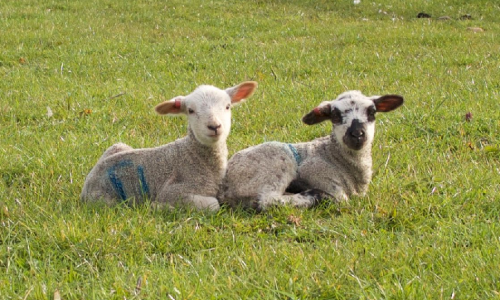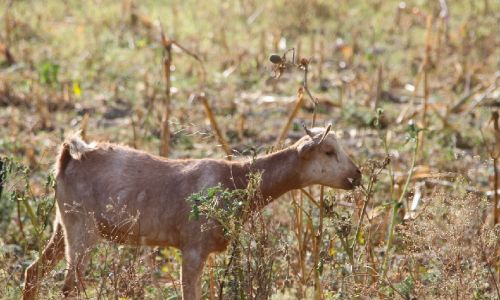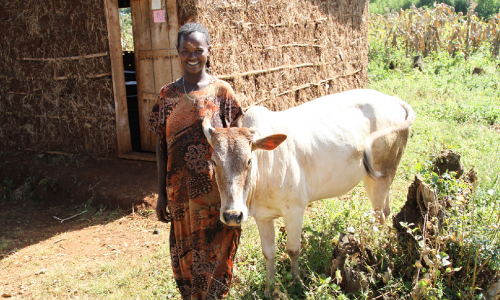How can vets support smallholders?
Will Wilkinson shares his views on why smallholders are easily overlooked when food production is considered, despite them being an important part of rural economies, offering many benefits for wildlife, the environment and animal welfare.
Will Wilkinson
‘’You’ve just got rid of every reason I have for not eating meat’’ contemplated a vegetarian friend as I carved a slow roast leg of home-grown lamb.
My smallholding started almost whimsically in 2017; wanting more connection to my food than a packet in a supermarket I advertised for local grazing and soon began a small flock. Like many smallholders, I produce a low input, high welfare, high quality product which is locally produced, slaughtered, processed and sold.
Smallholders are easily overlooked when food production is considered yet we are an important part of rural economies, offering many benefits for wildlife, the environment and animal welfare.
As a vet with a passion for welfare and the environment I have always been a passionate advocate for buying extensively farmed meat. Of those that are accurate, many of the alarming statistics regarding farming pertain to intensive systems, often in other countries which are not directly comparable to some of the extensive systems seen in the UK. Smallholders by nature tend to have low stocking densities, usually grazing stock extensively or in relatively free-range systems. Permanent pasture, highly valuable for biodiversity yet declining in the UK, is commonly used.
Historically, regions developed breeds which were well adapted to local conditions. Many of these disappeared or became rare following intensification and several breeds which would otherwise have been lost have only survived thanks to hobbyists and smallholders. This has preserved genetic lines which are more suited to certain areas and can be more disease resistant than highly intensified breeds. Additionally, local breeds tend to do well on lower inputs, improving sustainability.
Smallholders may keep a single or several species. Often there is the opportunity for co-grazing. This can be used as part of a responsible parasite control strategy which reduces the need for anthelmintics, benefitting the environment. Furthermore, as many smallholders operate on a small scale with a close connection to their animals -my sheep and hens come running when they see me- when animals are ill there is greater potential for treatment; stock become a hybrid of pet and farm animals. This connection with the animals also emphasizes that their lives matter; when they are slaughtered, the meat carries more than financial value.
There is added incentive to value it more highly and waste less, to respect our food more.
Additional benefits, besides those to biodiversity and welfare, exist. Feedstuffs - be they concentrates or forage - and equipment are often bought from local suppliers. Local businesses such as abattoirs and butchers are often used to process the meat. This is then sold locally. As well as reducing food miles and further improving welfare, smallholders keep money circulating in local economies and build up community networks. Given that many smallholders keep their livestock alongside other main employment, there is a good argument that we bring money into rural communities.
Historically, the UK landscape has been created and maintained by farming, particularly in the form of many small-scale farms. It is with the loss of this that we have decimated biodiversity and our connection with the landscape and our food. With the loss of these connections comes a multitude of misunderstandings about how to protect our planet. Smallholders offer a viable way back.
How can vets help with this?
- Many smallholders have lost out through corporatisation of farm and mixed practices. We do not provide regular income as dairy visits might but making sure there is some provision for us is important, even if it’s just being prepared to see the occasional chicken, duck or goose in small animal practice.
- Be the change you want to see. If you consume meat, milk, eggs and fish, be open to eating a little less and buying locally produced British produce. When considering eating animal products the question should not be whether they are good or bad as a whole, rather how much to consume and how they have been produced. Your choices count!How can the profession help with this?
- As a profession- and individual vets- we must be informed about the value of extensive and small scale farming for welfare, biodiversity and sustainable food production. We must be willing to speak up and defend this in the face of poorly informed rhetoric.
- Consider whether there is any capacity for the profession to discuss legislation regarding feeding kitchen waste to poultry as this would help reduce food waste, improving sustainability. Due to the current ASF epidemics it would be ill-advised to consider doing the same for pigs.
Will Wilkinson
Created by a group of farm animal, aquaculture and wildlife population health experts
Our Food and Farming working group is supporting the transition towards a more sustainable farming future — including the conservation and regeneration of natural ecosystems, through agriculture.



